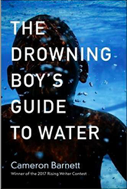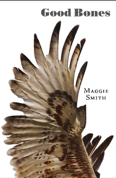In his holiday farewell, outgoing reviews editor Adam Tavel offers two mini-reviews of recent poetry collections.
Editor’s Note: Serving as reviews editor for Plume for the past two years has been a singular honor in my writing life. Long suspicious of reviews that stray into personal essay or academic treatise, I sought to embody a journalistic clarity, pace, and timeliness during my tenure as resident critic, while still acknowledging the serious questions of poetic craft and the limits of my own subjectivity. Though our wider culture is awash with incivility, ignorance, and intolerance, the poetry of America remains as inviting, vibrant, and diverse as her people. I hope the 38 titles I’ve reviewed over the course of 24 consecutive issues reflect that bountiful vitality.

The Drowning Boy’s Guide to Water by Cameron Barnett
Autumn House Press
$17.95, 104 pages
published November 2017
In his vivacious and impressive debut, Cameron Barnett examines the intricacies of blackness and reflects on how identity is inevitably complicated by questions of race. Like most first books, The Drowning Boy’s Guide to Water is, to some extent, a self-portrait, but Barnett’s poems never suffer from naivety or navel-gazing. Instead, they ache to reconcile our vast, imaginative, and jumbled inner lives with the inevitably reductive cruelty of labels, particularly when those labels facilitate the harm or obliteration of people of color. Much of the collection interrogates black masculinity, as we see in “Stack,” which stoically renders a father-son firewood narrative, “Baby,” which wrestles with interracial romance, and “Supernova,” which tenderly meditates on how a young boy represses his brother’s death, unable to see “what room America has left/for black love.” Elsewhere, Barnett demonstrates the fierce moral outrage necessary for our current political crisis in his vehement “Eulogy for the Confederate Battle Flag,” his sustained and muscular elegy “Crepe Sole Shoes” (which reflects on the horrific murder of Emmett Till), and his electrifying ode “Nigger,” which talks back to the epithet itself: “Sable child/swathed in mystery, scimitar-swift,/and lithe-hearted—what do you stand for?” Given the intensity of the book’s inquisitions, where water and fire recur as elemental symbols, Barnett wisely offers some playful explorations for counterpoint, such as the rueful “Nonbinding Legislation, or a Resolution” (“I hate when white people/hate white people because hating white people/is fashionable.”) and “Memoir of a Plagiarist,” which—as a likely homage to Bishop’s “One Art”—finds its speaker stealing Hamlet, then the Chrysler Building, then constellations in the night sky. “Smoke,” a disarming, lyrical elegy for an uncle who endured enormous suffering as a burn victim, remains one of Barnett’s strongest poems. Reminiscent of Larry Levis in its assured, legato lines, the poem builds into a larger consideration of anguish and powerlessness: “Once in a while I’ll walk home and look up to see smoke/coming from the next neighborhood over and I wonder/if I might be watching someone’s death not too far from me.” Only a few of Barnett’s poems falter: for all of its gusto, the long sequence “The Bones We Lose” treads on familiar pulp character types, and “Iron Angel” suffers from overwrought lines (“And in the winter the freezing pool must expand/and contract, a sort of breathing, a sort of release. New paths are made/from cracking open old barriers.”) Regardless, The Drowning Boy’s Guide to Water succeeds as a dynamic and distinct first book that prays, “if water is rebirth/Lord make my flood holy.”

Good Bones by Maggie Smith
Tupelo Press
$16.95, 114 pages
published October 2017
The viral success of Maggie Smith’s “Good Bones”—which received critical acclaim from The New York Times, Public Radio International, and even featured on an episode of CBS’ Madam Secretary—became one of 2016’s defining literary moments. While the now-famous poem lends its name to Smith’s third poetry collection, and remains one of the book’s highlights, readers will find a far greater bounty within. Informed by the sacrifice, trepidation, and awe of early motherhood—“a spell/that is only now beginning to break”—Good Bones presents a rollicking array of lyrics, myths, and meditations. Notable for their heart, understatement, and deceptive accessibility, Smith’s poems yearn to reconcile how a world of wonders can remain a world of thorns. “Weep Up,” the collection’s brief opening poem, is at once a celebration of a toddler’s innocent verbal error (she greets the dawn birds by saying “weep up” instead of “wake up”) as well as an affirmation of the bitter truth that arises from her unintentional irony. In this same vein, “You Could Never Take a Car to Greenland,” “The Future,” and “Leaves” all inhabit a child’s growing awareness of language and reality, where ultimately “the leaves/must let go, or else the tree would keep them.” Dreamy, primal, and stark, several fragmentary scenes from an impressionistic myth appear throughout, as in “The Crows,” where we trace the maturation of an unnamed girl who “chooses to believe the crows/sicssored her into being.” Throughout, Smith demonstrates a remarkable tonal elasticity. She can take readers from a plainspoken narrative where a sticky-fingered child reaches for a hug to a dark fable where a totemic god-hawk soars, all in the span of a few pages. Smith might be at her best in poems that gaze unflinchingly at human suffering and still find just cause to persevere: “Reading the Train Book, I Think of Lisa” recounts how a board book conjures a friend’s suicide, “Panel Van” wrestles with the threat of roving pedophiles, and the devastating “Dear” grieves the loss of two children who never were, yet are “together swimming the air,/buoyed by my son’s breath/as he sleeps.” “Parachute,” which achingly recounts how a mother “strapped/her infant to her chest, opened/the eighth-floor window,/and jumped,” might very well be the collection’s most devastating achievement. In a literary landscape where hype and talent intersect seemingly at random, it’s heartening to know a poet as gifted as Maggie Smith can reach, and unite, such broad readership under poetry’s banner.
Adam Tavel won the Permafrost Book Prize for Plash & Levitation (University of Alaska Press, 2015). He is also the author of The Fawn Abyss (Salmon Poetry, forthcoming) and the chapbook Red Flag Up (Kattywompus, 2013). Tavel won the 2010 Robert Frost Award and his recent poems appear or will soon appear in Beloit Poetry Journal, The Gettysburg Review, Sycamore Review, Passages North, The Journal, Valparaiso Poetry Review, and American Literary Review, among others. He can be found online at http://adamtavel.com/.

